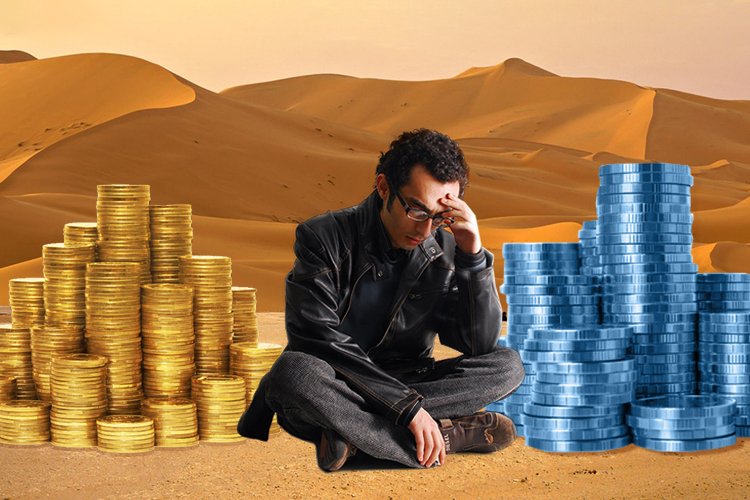Crypto Overtake The Gold Twice. For The First Time

The fashionable comparison of the cryptocurrency and gold has at last acquired some material meaning. Analysts have compared the volume of payments in gold and bitcoins. They have come to the conclusion that the crypto has placed the precious metal behind almost twice - $848 billion vs $446 billion. By the end of the year, the volume of payments in crypto must grow to $1.3 trillion. Moreover, only bitcoin was taken into consideration while counting, other cryptocurrencies were not taken into account.
Could it be what the crypto enthusiasts have spoken about many times? Digital assets have acquired real value and now may serve as real “guardians of value”?
“The information age that began with Johann Gutenberg with his printing press ended with the advent of bitcoin, - director of the Finatex Company, a large American operator of the over-the-counter assets trading and an escrow agent, Thomas KONLEY says in the exclusive comment to Bitnewstoday.ru. – What makes bitcoin so popular? The blockchain technology, it is based on, which allows humanity to escape its main mistake – the family (oligarchic – ed. note) control over the world banking system. Blockchain allows removing this unreliable third party”.
Do we have to argue with the crypto expert’s opinion? Yes, probably. But in one thing, he seems to be right: “the unreliable third party” has already annoyed everyone. 82% of the global wealth is concentrated in the hands of 1% of the world’s richest residents, the Oxfam report says. The total fortune of billionaires has increased by 13% since 2010 when incomes of the poorest part of the population have increased by only 2%. Moreover, the most part of the world’s richest residents inherited their fortunes. And by 2020 500 the world’s richest residents will be able to leave $2.4 trillion to their descendants. This amount of money exceeds the budgets of many countries from G20.
Such a gap between wealth and poverty had to cause the economic response. And here it is – the cryptocurrency. After all, no one rated it as the means of redistribution of the global wealth. However, such an interpretation of the value acquisition of the cryptocurrency has been suggested for a long time.
No wonder that large regions with a great amount of poor population pay close attention to the digital economy. India, Iran, South American region, African countries, Russia - the list can be continued. Participation in the blockchain, crypto mining is the chance to tear off a small piece of the world’s pie for a person who has no perspectives for a decent level of living in the conditions of the traditional economy. On the territory of Russia, people mine 2000 bitcoins per week “behind the scenes”, in China – 600, in Nigeria – 580. With each passing day the number of such people increases. Therefore, the number of transactions and the volume of payments grow. For the same reasons, most large financial conglomerates and investors look at the crypto market with suspicion.
But how long will this tendency last? “The ability to confirm transactions with by consensus opens the door to a totally automated world. – Thomas KONLEY continues. – And after such a breakthrough these guys (the representatives of financial monopolies and their supporters in the parliament) want to accept bitcoin as property to tax it, enact laws, regulate, though they do not understand the essence of the crypto market. What the hell?!”
Nikolaos PANIGIRTZOGLOU, a senior analyst of JPMorgan in late 2017, said that bitcoins could become the main asset class and compete with gold only after the US markets become more open to cryptocurrencies and new effective and regulated market mechanisms such as futures and exchange funds appeared.
"The advent of bitcoin futures can raise virtual coins to a new class of assets, - he explained, - it depends on their acceptance as a guardian of value and a means of payment. In this case, the cryptocurrencies have the potential for further growth".
As we see, both experts are right. The number of exchange transactions with the cryptocurrency is increasing, as well as the number of over-the-counter transactions. This is not a contradiction. There are simply two tendencies that few people mention.
For the first time in the world history the economic trend – purchase of values by digital coins – is coming not from rich countries to poor ones, but vice versa. Residents of the Third World countries simply don’t have a job, which could provide them with a decent level of living; but they do have electricity and spare time. The crypto is gradually becoming a great balancer of opportunities.
For the future of digital assets, there are two diametrically opposite points of view. Some believe that the cryptocurrency should keep the track of the greatest institutionalization and acquire value due to the legal status and the expansion of the list of trading instruments. Others, on the contrary, are sure that the open blockchain consensus is the economic and legal mechanism that attaches value to the cryptocurrency. The more people will be involved in the blockchain, the higher the digital assets will be quoted. In other words, some take the market appeal for the value, others - the trust of the masses.
What track the development of the digital economy will keep, time will tell. Quite possibly, there will be two independent crypto markets - exchange (speculative) and consensus - with tokens of different nature, which will complement each other and exchange value. No matter how the situation turns, an interesting future is waiting for us.